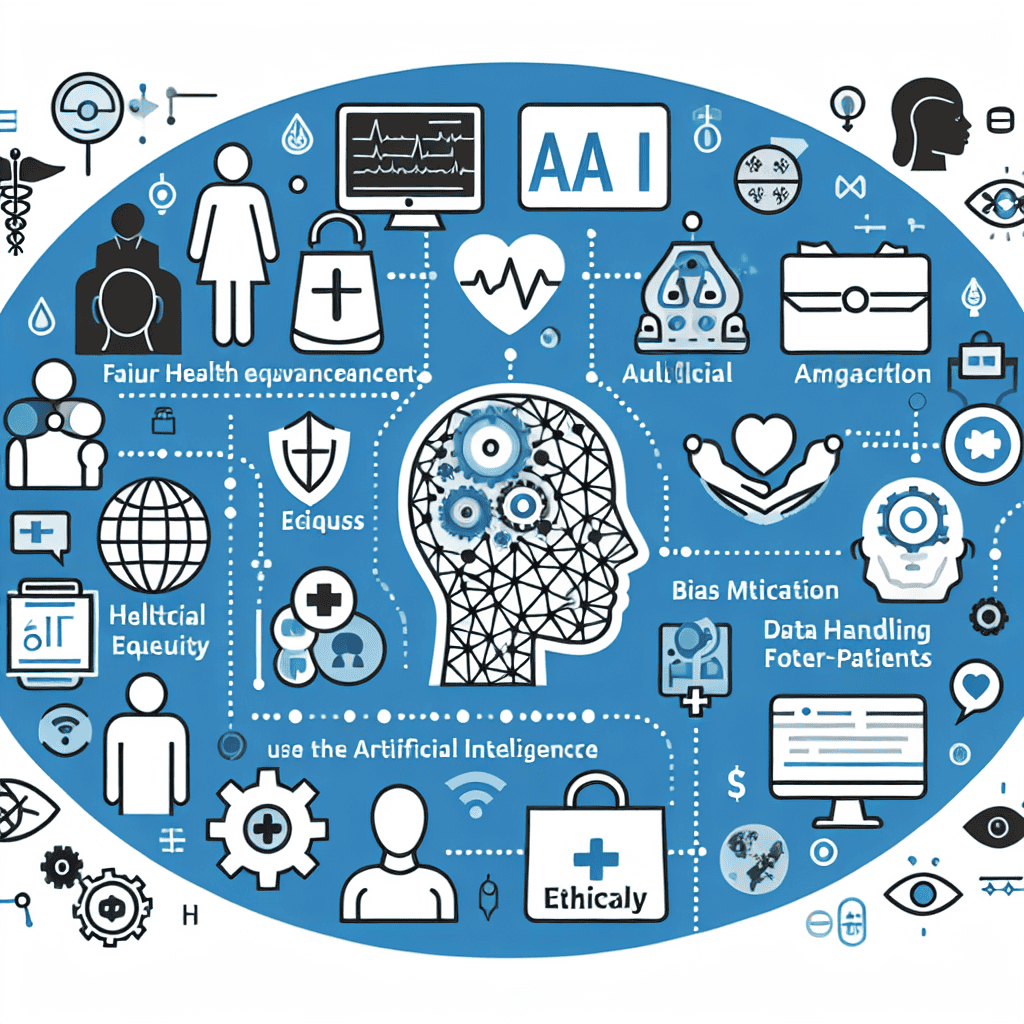HIMSSCast: Advancing Health Equity Through Responsible AI and Bias Mitigation

In the rapidly evolving landscape of healthcare, the integration of artificial intelligence (AI) presents both unprecedented opportunities and significant challenges. As AI technologies become more prevalent, the potential to advance health equity through responsible AI and bias mitigation is a critical area of focus. This article explores the multifaceted dimensions of this topic, delving into the role of AI in healthcare, the importance of addressing bias, and strategies for ensuring equitable outcomes.
The Role of AI in Healthcare
Artificial intelligence is revolutionizing healthcare by enhancing diagnostic accuracy, personalizing treatment plans, and streamlining administrative processes. The integration of AI in healthcare systems promises to improve patient outcomes and reduce costs. However, the deployment of AI technologies must be approached with caution to ensure that they do not inadvertently exacerbate existing health disparities.
AI’s ability to process vast amounts of data quickly and accurately makes it an invaluable tool in healthcare. For instance, AI algorithms can analyze medical images with a level of precision that rivals or even surpasses human experts. This capability is particularly beneficial in fields such as radiology and pathology, where early detection of diseases can significantly impact patient outcomes.
Moreover, AI-driven predictive analytics can identify at-risk populations and facilitate early interventions. By analyzing patterns in electronic health records (EHRs), AI can help healthcare providers anticipate patient needs and allocate resources more effectively. This proactive approach has the potential to improve health outcomes and reduce the burden on healthcare systems.
Despite these advantages, the implementation of AI in healthcare is not without challenges. One of the primary concerns is the potential for AI systems to perpetuate or even amplify existing biases in healthcare delivery. Addressing these biases is crucial to ensuring that AI technologies contribute to health equity rather than exacerbate disparities.
Understanding Bias in AI Systems
Bias in AI systems can arise from various sources, including biased training data, algorithmic design, and human oversight. Understanding the origins and manifestations of bias is essential for developing strategies to mitigate its impact on healthcare outcomes.
One of the primary sources of bias in AI systems is the data used to train algorithms. If the training data is not representative of the diverse populations that the AI system will serve, the resulting models may produce biased outcomes. For example, if an AI system is trained predominantly on data from a specific demographic group, it may not perform as well for individuals from other groups, leading to disparities in care.
Algorithmic design can also introduce bias. The choices made by developers during the design and implementation of AI systems can inadvertently favor certain outcomes or populations. For instance, if an algorithm prioritizes efficiency over equity, it may produce results that benefit some groups at the expense of others.
Human oversight is another critical factor in the emergence of bias in AI systems. The individuals responsible for developing and deploying AI technologies may have unconscious biases that influence their decisions. These biases can be reflected in the design of AI systems and the interpretation of their outputs.
To address these challenges, it is essential to adopt a comprehensive approach to bias mitigation that encompasses data collection, algorithmic design, and human oversight. This approach should be guided by a commitment to transparency, accountability, and inclusivity.
Strategies for Bias Mitigation in AI
Mitigating bias in AI systems requires a multifaceted approach that addresses the various sources of bias and promotes equitable outcomes. Several strategies can be employed to achieve this goal, including improving data diversity, enhancing algorithmic transparency, and fostering interdisciplinary collaboration.
Improving data diversity is a critical step in reducing bias in AI systems. By ensuring that training data is representative of the diverse populations that the AI system will serve, developers can create models that produce more equitable outcomes. This may involve collecting data from underrepresented groups and incorporating it into the training process.
Enhancing algorithmic transparency is another important strategy for bias mitigation. By making the inner workings of AI systems more transparent, developers can identify and address potential sources of bias. This transparency can also facilitate accountability, as stakeholders can scrutinize the decisions made by AI systems and hold developers accountable for their outcomes.
Fostering interdisciplinary collaboration is essential for addressing the complex challenges associated with bias in AI systems. By bringing together experts from diverse fields, including computer science, healthcare, ethics, and social sciences, organizations can develop more comprehensive and effective strategies for bias mitigation. This collaboration can also help ensure that AI systems are designed and implemented with a focus on equity and inclusivity.
In addition to these strategies, it is important to establish robust governance frameworks that promote responsible AI development and deployment. These frameworks should include guidelines for ethical AI use, mechanisms for monitoring and evaluating AI systems, and processes for addressing bias-related issues as they arise.
Case Studies: AI and Health Equity
Several case studies illustrate the potential of AI to advance health equity and the challenges associated with bias mitigation. These examples highlight the importance of responsible AI development and the need for ongoing efforts to ensure equitable outcomes.
One notable case study involves the use of AI in breast cancer screening. Researchers have developed AI algorithms that can analyze mammograms with high accuracy, potentially improving early detection rates. However, studies have shown that these algorithms may perform less effectively for women of certain racial and ethnic backgrounds. To address this issue, researchers are working to improve the diversity of training data and refine algorithmic models to ensure equitable performance across all populations.
Another example is the use of AI in predicting patient readmissions. AI systems can analyze EHR data to identify patients at high risk of readmission, enabling healthcare providers to implement targeted interventions. However, if the training data used to develop these models is biased, the predictions may disproportionately affect certain groups. Efforts to mitigate this bias include incorporating social determinants of health into predictive models and ensuring that data collection processes capture the full spectrum of patient experiences.
These case studies underscore the importance of ongoing research and collaboration to address bias in AI systems and promote health equity. By learning from these examples, healthcare organizations can develop more effective strategies for leveraging AI to improve patient outcomes and reduce disparities.
The Future of AI in Advancing Health Equity
The future of AI in healthcare holds great promise for advancing health equity, but realizing this potential requires a concerted effort to address bias and promote responsible AI development. As AI technologies continue to evolve, it is essential to prioritize equity and inclusivity in their design and implementation.
One promising avenue for advancing health equity through AI is the development of personalized medicine. By leveraging AI to analyze genetic, environmental, and lifestyle factors, healthcare providers can tailor treatment plans to individual patients, improving outcomes and reducing disparities. However, achieving this goal requires addressing biases in genetic data and ensuring that AI models are trained on diverse populations.
Another area of potential is the use of AI to address social determinants of health. By analyzing data on factors such as income, education, and housing, AI systems can help healthcare providers identify and address the root causes of health disparities. This approach requires collaboration between healthcare organizations, policymakers, and community stakeholders to develop comprehensive strategies for improving health equity.
As AI technologies become more integrated into healthcare systems, it is crucial to establish ethical guidelines and governance frameworks that promote responsible AI use. These frameworks should prioritize transparency, accountability, and inclusivity, ensuring that AI systems are designed and deployed with a focus on equity.
In conclusion, advancing health equity through responsible AI and bias mitigation is a complex but achievable goal. By understanding the sources of bias, implementing effective mitigation strategies, and fostering collaboration across disciplines, healthcare organizations can harness the power of AI to improve patient outcomes and reduce disparities. As we move forward, it is essential to remain vigilant in our efforts to ensure that AI technologies contribute to a more equitable and inclusive healthcare system.
Conclusion
The integration of AI in healthcare presents both opportunities and challenges in advancing health equity. By understanding the role of AI, addressing bias, and implementing effective mitigation strategies, healthcare organizations can leverage AI technologies to improve patient outcomes and reduce disparities. The case studies and future directions discussed in this article highlight the importance of responsible AI development and the need for ongoing efforts to ensure equitable outcomes. As we continue to explore the potential of AI in healthcare, it is essential to prioritize equity and inclusivity, ensuring that these technologies contribute to a more just and equitable healthcare system for all.





